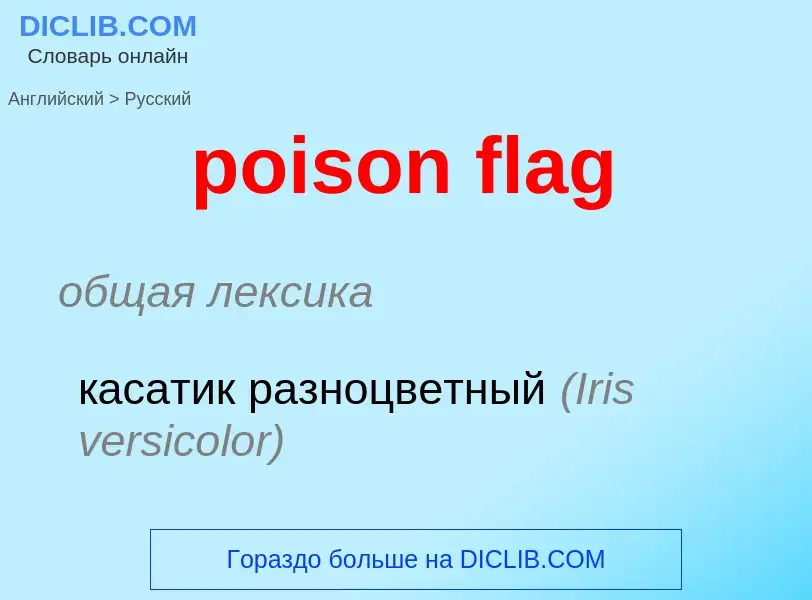Translation and analysis of words by ChatGPT artificial intelligence
On this page you can get a detailed analysis of a word or phrase, produced by the best artificial intelligence technology to date:
- how the word is used
- frequency of use
- it is used more often in oral or written speech
- word translation options
- usage examples (several phrases with translation)
- etymology
poison flag - translation to russian
общая лексика
касатик разноцветный (Iris versicolor)
фармацевтический термин
ирис разноцветный
общая лексика
поглотитель нейтронов
Definition
Wikipedia

Toxicodendron is a genus of flowering plants in the sumac family, Anacardiaceae. It contains trees, shrubs and woody vines, including poison ivy, poison oak, and the lacquer tree. All members of the genus produce the skin-irritating oil urushiol, which can cause a severe allergic reaction. The generic name is derived from the Greek words τοξικός (toxikos), meaning "poison," and δένδρον (dendron), meaning "tree". The best known members of the genus in North America are poison ivy (T. radicans), practically ubiquitous throughout most of eastern North America, and western poison oak (T. diversilobum), similarly ubiquitous throughout much of the western part of the continent.
The genus is a member of the Rhus complex, and has at various times been categorized as being either its own genus or a sub-genus of Rhus. There is evidence which points to keeping Toxicodendron as a separate monophyletic genus, but researchers have stated that the Toxicodendron and Rhus groups are complex and require more study to be fully understood.
Plants in the genus have pinnately compound, alternate leaves and whitish or grayish drupes. They are quite variable in appearance. The leaves may have smooth, toothed, or lobed edges, and all three types of leaf edges may be present in a single plant. The plants grow as creeping vines, climbing vines, shrubs, or, in the case of lacquer tree (T. vernicifluum) and poison sumac (T. vernix), as trees. While leaves of poison ivy and poison oaks usually have three leaflets, sometimes there are five or, occasionally, even seven leaflets. Leaves of poison sumac have 7–13 leaflets, and of Lacquer Tree, 7–19 leaflets.
The common names come from similar appearances to other species that are not closely related and to the allergic response to the urushiol. Poison oak is not an oak (Quercus, family Fagaceae), but this common name comes from the leaves' resemblance to white oak (Quercus alba) leaves, while poison ivy is not an ivy (Hedera, family Araliaceae), but has a superficially similar growth form. Technically, the plants do not contain a poison; they contain a potent allergen.
The resins of certain species native to Japan, China and other Asian countries, such as lacquer tree (T. vernicifluum) and wax tree (T. succedaneum), are used to make lacquer, and, as a byproduct of lacquer manufacture, their berries are used to make japan wax.


